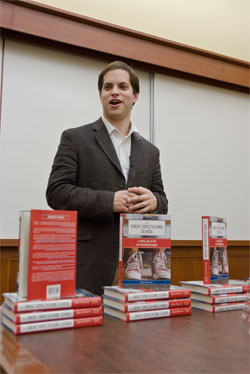Life in the Blackboard Jungle
Most books about school in the inner city present teachers as “saviors with the golden touch,” says Dan Brown, a first year student at TC in the Teaching of English program. Not so Brown’s own best-selling memoir, The Great Expectations School: A Rookie Year in the New Blackboard Jungle. The story of his first year as a teacher, at PS 85 in the Bronx, the book is a painfully honest account of an idealistic young man completely at sea in a room full of endearing, difficult fourth graders, unsupported by either administration or most of his teaching colleagues.
At talks in Milbank Chapel and the Gottesman Libraries in October, Brown said he began The Great Expectations School partly as “a cathartic spilling” after that experience, during which “my hair fell out, my girlfriend and I broke up, and I became a total mess,” and which ended in his leaving the school and (temporarily) the teaching profession. But he also sought to truly spotlight students, whom he feels have been largely absent as characters in books about inner-city schools.
“There’s this big discussion
At the Milbank event, Brown read a moving excerpt from the book about his first day on the job – “for 22 years I’d been on one path and 25 kids from the Bronx had been on another” – in which, after writing his name and the word “TEAM” on the blackboard, he quickly discovers he has been handed a classroom full of the school’s most difficult kids. He contemplates quitting, but stays because of one child, a girl named Sonandia -- “my beacon, even in the most brutal moments,” Brown told the Milbank audience; “if she was learning, it was all worth it.”
When Brown is unable to gain control over his classroom, Sonandia’s parents ask to have her transferred to another teacher. “I couldn’t argue with them,” he said. But in a turn of events he calls “life changing, amazing, shocking,” Sonandia, when told of the change, bursts into tears, saying, “I don’t want to leave Mr. Brown.”
“It taught me that even in the bleakest moments, you don’t know what you’re putting out to other people, and what’s coming across,” Brown said. “If kids know you really care, that you love them and will go to bat for them, they’ll be on your side.”
After spending a year away from teaching, Brown worked at a private school, where kids writing about their summer vacations asked “Mr. Brown, how do you spell
“I feel like I’m getting an exceptionally rich source of preparation here to run my own classroom,” he said. “Teachers are so critical within the fabric of our society, and it’s so important to know that I’m part of this incredibly vast brotherhood and sisterhood.”
Published Tuesday, Dec. 11, 2007
